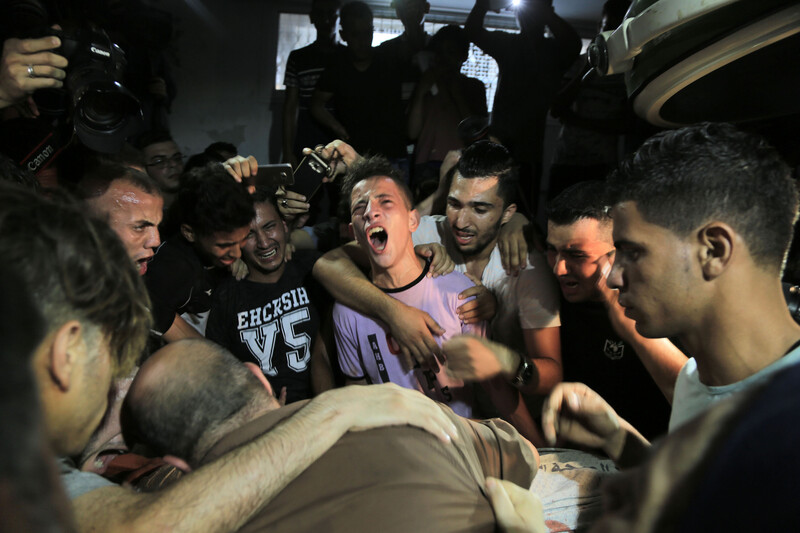ICC judges order outreach to victims of war crimes in Palestine
Rights and Accountability 17 July 2018

Judges in The Hague have ordered the International Criminal Court to reach out to victims of war crimes in Palestine.
It is a sign the court may be inching towards ending Israeli impunity.
On Friday, the ICC’s Pre-Trial Chamber 1 ordered court administrators to establish “a system of public information and outreach activities for the benefit of the victims and affected communities in the situation in Palestine.”
The Pre-Trial Chamber is a panel of judges that supervises how the ICC prosecutor’s office carries out its investigative and prosecutorial activities. It has the responsibility to guarantee the rights of suspects, victims and witnesses during investigations by the prosecutor.
The court will also create a page on its website “especially directed to the victims in the situation in Palestine.”
The decision facilitates the gathering of evidence that could be used in indictments or trials of suspected war criminals.
Death threats
The order instructs the court’s public information and victims participation sections to “take a central role in the initial phase of approaching victims, nongovernmental organizations and intermediaries.”
Anticipating the dangers victims may face coming forward, the judges say that court officials “may consult with the Victims and Witnesses Unit regarding protection issues.”
Nongovernmental organizations, particularly the Palestinian human rights groups Al-Haq, Al Mezan and the Palestinian Center for Human Rights, have played a key role in collecting evidence of Israeli war crimes and crimes against humanity that they have handed over to the ICC prosecutor.
In September, the groups turned over dossiers detailing crimes of persecution, apartheid, the extensive theft, destruction and pillage of Palestinian property and evidence of the “wilful killing and murder” of hundreds of Palestinians since 2014 in the occupied West Bank, including East Jerusalem.
Previously, they gave the prosecutor evidence related to crimes committed by senior Israeli civilian and military officials during Israel’s 2014 attack on Gaza that left more than 2,200 Palestinians dead.
While doing this work, human rights defenders have faced death threats and harassment likely perpetrated by Israel or its surrogates.
Those death threats have been investigated by authorities in the Netherlands, where the ICC is based.
In a joint statement, Al-Haq, Al Mezan and the Palestinian Center for Human Rights express hope that the Pre-Trial Chamber’s order “would be implemented in an effective manner.”
Worry in Israel
The decision to reach out to victims is causing worry in Israel, as this discussion on Israeli public television channel Kan indicates:
In the discussion, translated and subtitled by activist Ronnie Barkan, a commentator calls the judges’ decision “outrageous” and “a dramatic statement advancing towards an investigation of Israel and Israelis.”
Israel is refusing to comment officially, but Alan Baker, a former senior Israeli diplomat, called the Pre-Trial Chamber’s decision “quite crazy” and claimed that the ICC was “openly turning itself into a Palestinian propaganda engine, similar to the [United Nations] Human Rights Council.”
Foot dragging
Yet the Pre-Trial Chamber’s decision does not by itself indicate that the ICC prosecutor’s office, headed by Fatou Bensouda, is about to issue indictments against Israeli war crimes suspects.
The Palestinian human rights groups note in their statement that the Pre-Trial Chamber’s order to reach out to victims was not taken by, or at the request of, the chief prosecutor.
The situation in Palestine has been under preliminary examination by the prosecutor’s office since 2015.
A preliminary examination is the first step in the process to determine whether to open a formal investigation, which can then lead to indictments and trials.
But while a preliminary examination is carried out whenever a referral is made, it is open-ended and can continue for years, at the chief prosecutor’s discretion.
However in April, Bensouda issued an unprecedented warning that Israeli leaders could ultimately face trial for the killings of unarmed Palestinians in the Gaza Strip during the Great March of Return protests that began at the end of March.
The chief prosecutor’s warning was surprising given her foot-dragging on the preliminary investigation and her demonstrated reluctance in another case to hold Israel to account.
Late last year, Bensouda reaffirmed there was a “reasonable basis to believe” that the Israeli military committed “war crimes” when it attacked an activist flotilla to Gaza in 2010.
But she claimed that there was “no potential case” of “sufficient gravity” under the court’s founding Rome Statute to proceed with a formal investigation.
Her insistence that the court did not need to act in the case of an extraordinary military attack on civilian vessels in international waters flew in the face of scathing criticism from the Pre-Trial Chamber.
In 2015, the ICC judges had ordered Bensouda to re-examine an earlier decision not to proceed with an investigation into the flotilla case.
In December, the law firm for the victims of the Mavi Marmara attack told The Electronic Intifada that it was “lamentable that the prosecutor has been considering only the question of whether to open an investigation for over four years now.”
The lawyers, who said they would once again appeal, added that Bensouda’s office “could have by now in actual fact investigated the case, instead of avoiding its responsibility to strive to end impunity for international crimes.”
The Pre-Trial Chamber’s decision to reach out to victims in Palestine now shows that even if Bensouda continues to drag her feet, the judges at least understand the urgent need for justice and the importance of hearing testimony from Palestinian victims.
In the meantime, Israel continues to create new victims.
On Sunday, Palestinians buried Amir al-Nimra and Louay Kuhail, two friends who were playing on the roof of the unfinished al-Katiba building in Gaza City when they were killed in an Israeli airstrike the previous day.
Al Mezan reported that the boys were both 14 years old.




Geen opmerkingen:
Een reactie posten